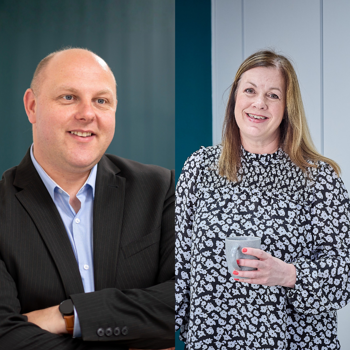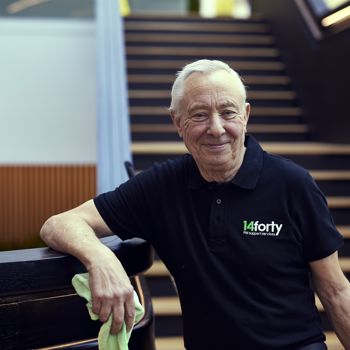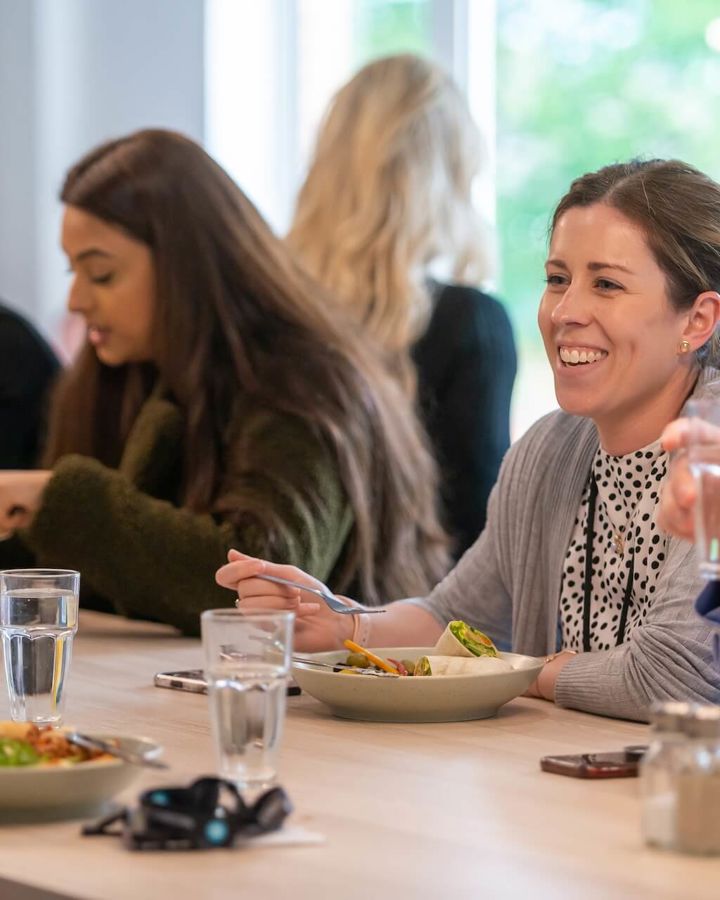10th October 2025 marks World Mental Health Day
We know that the Integrated FM services we deliver are only possible because of the fantastic people behind them. That’s why supporting our colleagues’ wellbeing is such a big priority.
For World Mental Health Day, we sat down with Darren Rowledge and Sarah Williams, two of our brilliant Mental Health Ambassadors, to chat about their experiences, what inspired them to take on the role, and how they’re helping to create a culture where we can openly talk about how we’re really doing.

Can you tell us a little about yourself and your role?
Darren: I’m a Regional Manager looking after multiple services across several sites, including security, cleaning, and catering.
Sarah: I’m a Contract Manager on a large account that covers catering, cleaning, and security. Darren and I work closely together and have a great working relationship. We’ve got busy jobs, but we always find the time to have a laugh together and catch up on family life.
What inspired you to take on the role of Mental Health Ambassador?
Darren: It came through a Compass initiative. I’ve faced my own mental health challenges in the past, so I wanted to be that someone my team can turn to for guidance, especially in security where people can be more reluctant to open up in such a male-dominated environment. I think it’s important to be able to relate to the team, share the support available, and make sure those resources are visible.
Sarah: Yes, it was spearheaded by Compass asking people to volunteer. If we're being honest, we’ve all struggled with something, and sometimes we don’t like to show that to the people we work with. A few years ago, I recorded a mental health awareness video on the topic of loneliness. It made me realise how often we see ‘perfect lives’ being portrayed on social media, and how isolating that can be for many people.
What do you find rewarding about being a Mental Health Ambassador?
Darren: Promoting that supportive culture within our teams where people have the information they need and can openly talk about any issues that may come up.
Sarah: One of the You Matter posters is about asking twice. There have been situations where our colleagues have been facing challenging circumstances and defaulted to saying, “I’m fine.” It’s about understanding what they need personally. Going beyond ‘how are you’ to ask about their wellbeing specifically and showing them that they have somebody who will listen. We also have Mental Health First Aiders who can provide support when someone is really struggling and needs someone to talk to.
Can you tell us more about You Matter?
Darren: You Matter is Compass’ mental health awareness campaign. It gives colleagues a QR code linking staff to health and wellbeing support and a helpline that they’re encouraged to call. We’ve got posters up on all our sites too, so it’s easy for everyone to access support if they need it.
Sarah: To add to Darren’s point, security teams often work from cabins without the usual office noticeboards. When Darren became an ambassador, he got mental health noticeboards costed and installed at security sites so the information could be displayed where people work.
How does someone become a Mental Health Ambassador?
Darren: It starts with the training and resources. There are workshops on our e-learning platform covering signs to look for and how to seek support. Managers can also arrange reasonable adjustments like flexible hours or phased returns.
Sarah: It’s very much down to local teams. Something Darren and I looked at was the idea of the ‘elephant in the room’ - not avoiding those difficult conversations if someone needs help. People can wonder, ‘What should I do? What would I say? What advice should I give?’ and it’s not about giving advice. It’s about listening and encouraging the colleagues we work with to ask the right questions.
What are some simple things we can do at work to improve our mental wellbeing?
Sarah: Make space to talk. Step away from the laptop for a coffee and chat and ask about life outside of work. It builds trust and helps you support people on a more personal level. On one occasion when a colleague had to take time off, we gave them a welfare package filled with things we knew they liked and that would make them smile. It’s so easy to get swept up in the world of work, so it’s important to remind people that you acknowledge that their families come first. It’s about remembering that behind our business, there are people, and they’re our bread and butter.
Be A Star, Compass’ employee recognition programme, is important from a mental health point of view too. It’s not always about winning a prize but rather letting somebody know that they’ve been publicly recognised and thanked for their contribution.
Why is having a dedicated day like World Mental Health Day so important?
Darren: I think it’s important to raise that awareness so we can shout about mental health, share our knowledge, and create a more open dialogue.
Sarah: It resonates with everybody. Maybe it’s someone in your family, a close friend, or you’ve experienced it yourself. It could be that neurodiverse needs aren’t being met, financial pressures are building, or social media is affecting someone’s mental health. Sometimes we just need a reminder of the impact these challenges can have. And knowing that your employer acknowledges the pressures we face beyond work makes a real difference.
Small actions, big impact
Our people are at the heart of everything we do, and conversations like this remind us of the importance of looking out for each other. A big thank you to Darren and Sarah for showing us how the small things can make a real difference, whether it’s asking twice, sharing resources, or making time for a coffee and a chat.
Find out more about our health & wellbeing initiatives here.


